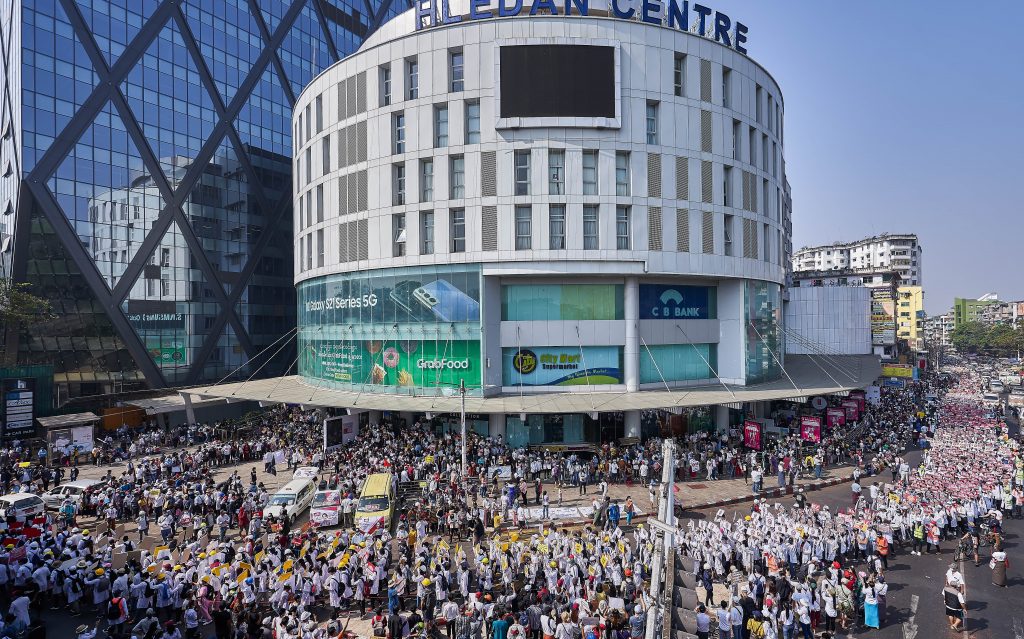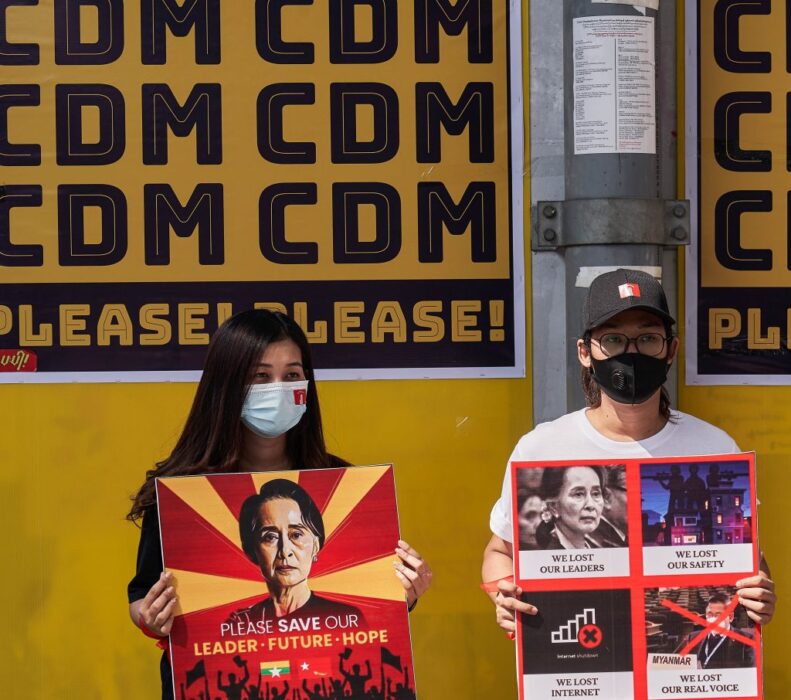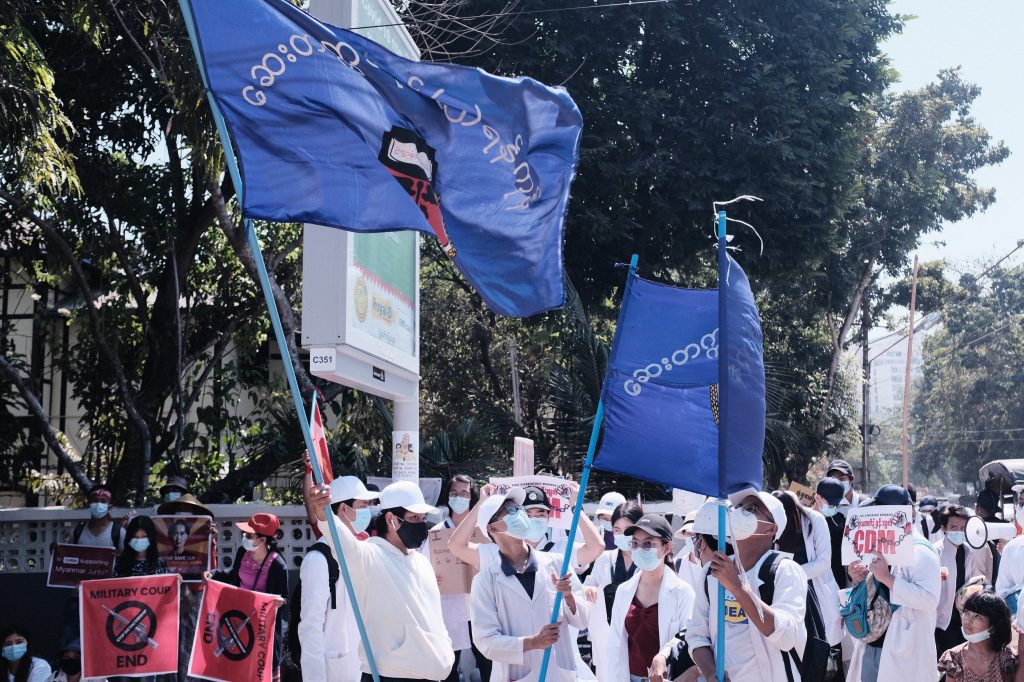By Thet Win Aung, Programme Support for Myanmar
In this blog Thet describes the recent military coup and the devastating effect this is having on Myanmar’s healthcare system.

Thet was born and raised in Yangon, Myanmar. Now residing in the East of England, Thet is a member of the Myanmar diaspora community living in the UK. Thet plays a key role in the development of the CGHP’s Myanmar health partnership – CYTIP. He has extensive experience working for local and international NGOs and development agencies based in Yangon.
Despite the COVID-19 pandemic, on 8th November 2020 thousands of people across the country marched to the polling stations to vote. They voted for a brighter future, electing the National League for Democracy (NLD) Party led by Aung San Suu Kyi. For the NLD it was a landslide victory and the party was ready to run its second term in office.
Although the NLD’s performance during its last 5 years in office has perhaps not meet all our expectations, the NLD received appreciation from the public in its management of the pandemic. The second wave of COVID-19 was well controlled; the NLD announced a vaccination plan and 1.5 million doses of COVID-19 vaccines were gifted by India. These vaccines landed in Yangon in January. This gave us hope for a swift return to normal life.
Then on 1st February 2021, things suddenly took a turn. The Myanmar military generals staged an unconstitutional coup d’état and the State Counsellor, Aung San Suu Kyi along with many of her ministers, were arrested.
Military leaders made poor calculations, underestimating the public’s rejection of their coup, notably civil servants and medical professionals. Days later, medical professionals across the country began demonstrating against the military coup in the Civil Disobedience Movement (CDM). They were later joined by thousands of civil servants and staff from the private sector.

Protestors in Yangon. Credit – Dhat Khae
And so, the protesting grew with thousands of people joining the general strikes. Hundreds of medical students in Yangon and Mandalay also marched to demonstrate against dictatorship. Before doctors and nurses joined the CDM, they discussed with private clinics and charity organisations for patient referral and provision of emergency health services to ensure patient well-being.
The Myanmar Ministry of Health and Sports has two main pillars: public health and medical care. Medical care has the largest number of staff who have joined the CDM. Myanmar has nearly 1250 government hospitals. One senior public health officer noted that since the coup, 85% of public hospitals have stopped functioning. He highlighted that although the military has been arresting well-known medical professionals and senior doctors who joined the CDM, this has not deterred health care workers who are still refusing to return to their duties. Many CDM staff are now being told to leave government quarters and hostels, merely making the situation worse.

Protestors in Yangon. Credit – Dhat Khae
As a result of the political turmoil regular COVID testing, care and treatment activities in hospitals have been halted. The initial plan to vaccinate the elderly and high-risk groups in high COVID-19 prevalent townships on 5th February was also cancelled and no further announcements have been published. The Ministry of Health and Sports’ Facebook account has, until now, been a regular source of information. The account has now been inactive since 3rd February. Needless to say, the coup is having a direct effect on the pandemic response and public access to vital health information. This compromises the health and wellbeing of many Myanmar citizens.
International responses to the military coup have been intensifying, with many countries reviewing their overseas development aid (ODA) programs in Myanmar. The World Bank and the Asian Development Bank announced a suspension of funds for all development activities in Myanmar, in addition to halting direct government assistance from international aid organisations.

Protestors in Yangon. Credit – Dhat Khae
If the political situation does not improve, many international development agencies will withdraw. There is no doubt that such a regression in international assistance will have a devastating effect for Myanmar, a country which spends approximately $950 million USD per year on its health care system – an extremely low figure by global and regional standards. For comparison, in 2018 the UK’s healthcare expenditure was £214.4 billion GBP. If the military continues to arrest and threaten healthcare professionals, an already under-staffed and under-resourced healthcare system will buckle, and the outcome will be catastrophic. These consequences will be felt by the people of Myanmar as access to healthcare diminishes and outcomes decline.
As a member of the Myanmar diaspora community, I look on praying for normalcy. I hope that democracy will soon be restored in my home country.
National Health Plan, Myanmar (2017-2021)
Office for National Statistics, Healthcare expenditure, UK Health Accounts: 2018
To learn more about our response to the military coup, please read the CGHP Statement.
Return to blogs
